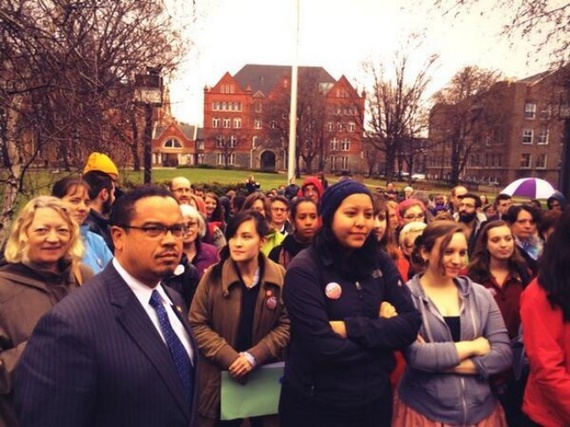Like this article? Chip in to keep stories like these coming.
What would American universities and colleges look like without adjuncts — those fully qualified, but temporary, academic staff members hired to teach? The simple answer is ”empty,” since most university and college courses in the U.S. are taught by adjuncts.
Campuses in the U.S. may look empty Feb. 25 as adjuncts stage actions for National Adjunct Action Week, February 23-27. Canadian academic colleagues are lending their support to their colleagues south of the border.
”In Canada, one-third of all academic staff are hired on a per course or limited-term basis with often inadequate compensation for only the teaching component of academic life,” said Robin Vose, President of the Canadian Association of University Teachers (CAUT) in an interview.
”The casualization of academic staff mirrors broader trends in the Canadian economy as employers replace permanent, full-time positions with temporary, part-time jobs with less pay and few, if any, benefits,” he added.
The University of Western Ontario Faculty Association has highlighted the experiences of contract academic staff and their challenges to make a living. Many work as “Road Scholars,” such as Mark Yaniszewski who has travelled southern Ontario for twelve years, stringing together enough teaching jobs to make ends meet.
Yaniszewski has taught at 14 universities in as many years as a contract faculty member since 1999. The dizzying numbers highlight an inconvenient truth: some of the most highly educated scholars are searching for work every four-to-eight months. Yaniszewski patrols online job boards at several universities, hoping to land the six or seven courses a year he needs to get by.
”I always tell people I teach at the University of the 401,” said Yaniszewski, ”I go up and down the 401 every day…This summer I spent nearly $800 a month on gas because I’m on the highway so much.”
Sonia Halpern is a popular instructor at Western University. With numerous teaching awards under her belt during her 24 years at Western, you would expect better treatment and job security. But non-tenure-track faculty live under the constant threat of losing their jobs.
”Another common misunderstanding,” says Halpern, ”is that we are transient, dabbling in academic life before moving on to something else. Not true; many have been here for years, some even for decades.”
Last year Halpern had, six classes, the largest courseload in 24 years. It felt good, but she soon realized she could not repeat that courseload again. She will try to supplement her income through public speaking engagements and teaching night courses at the art gallery downtown.
Some academic workers manage to move from four-month contracts to something resembling a regular job with benefits. In Peter Krats’ case, he taught sessional courses for thirteen years, with no job security, no benefits and no pension, before finally landing a limited-term appointment at Western.
Limited-term contracts are for a longer period of time. Krats’ conversion to a limited-term appointment to a maximum of five years means that the pay is higher, with health coverage and a pension plan. Unlike tenure-track professors, he is not guaranteed a permanent job, nor does include time for research.
”The work of contract academic staff in Canada and U.S. reveal the contradictions of today’s university system,” said Vose. ”Enrolment is growing, but instead of creating more tenure-track positions, administrations use precariously employed contract faculty to cover undergraduate teaching.”
CAUT advocates for the fair treatment of all academic staff regardless of employment status, including compensation for research and service as part of any teaching appointment on a pro-rata basis — that is, as a percentage of a regular professor’s appointment.
Tenure and academic freedom, do research, teaching and service, participation in institutional governance, fair compensation and good working conditions, are crucial so that academic staff can offer the best post-secondary education possible.
CAUT extends solidarity to its American counterparts during National Adjunct Action Week. For more information, go to www.caut.ca.
Some files for this article were contributed by the University of Western Ontario Faculty Association (UWOFA).
Angela Regnier is the Communications Officer for the Canadian Association of University Teachers (CAUT). A portion of this article was first published as a CAUT editorial in the CAUT Bulletin.



